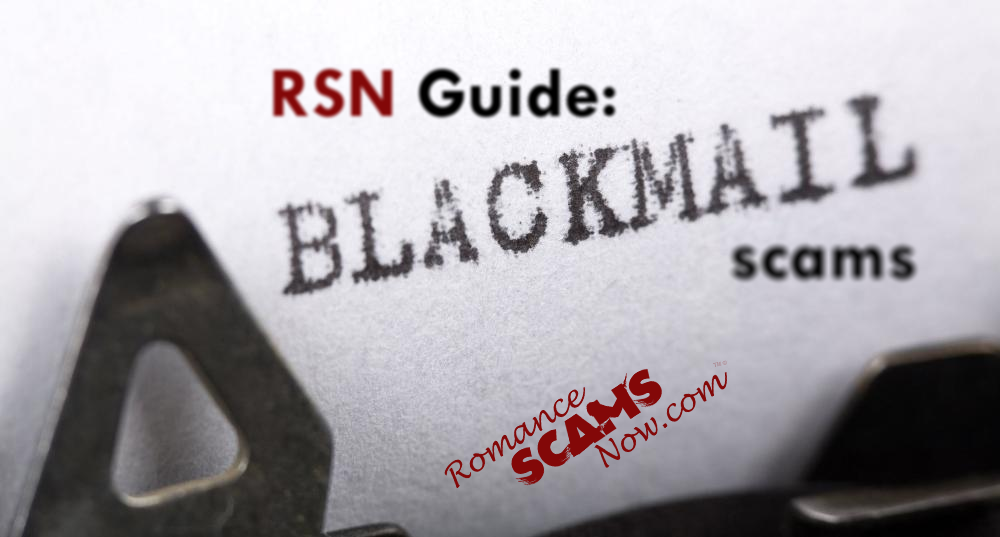
SCARS Institute’s Encyclopedia of Scams™ Published Continuously for 25 Years

RSN™ Guide: Avoiding The Latest Blackmail Scam
Scammers Are Experts At Manipulation, We Know This, Right?
But their expertise runs to far more than just romance scams. It includes a range of blackmail scams and extortion online as well.
Many of you have experienced scammers treats and extortion attempts at the end of a romance scam, from public shaming to treats of killing your children.
Another type of scam they engage in is the randomize “I know You Have Been Naughty” scam
In this they contact people online, usually based upon things they see in your social media profile.
They look for victims based upon what you show in your Facebook (or other profiles):
- Married
- Have children
- Are a professional or business person
- Important job or own business
- Is a politician (a favorite) or public/government job holder
- School or university teachers
These are some of the people that are most vulnerable to these kinds of blackmail threats.
How Does This Blackmail Actually Work?
You get an email or instant message or could even be a text message on your hone.
“I know about the secret you are keeping from your wife and everyone else. You can ignore this letter, or pay me a $8600 confidentiality fee in Bitcoin”.
It’s enough to send shivers down anyone’s spine, but these chilling words are part of a new scam targeting men (though there actually are variations that target women and gays – especially gays).
black·mail
ˈblakˌmāl/Noun: the action, treated as a criminal offense, of demanding money from a person in return for not revealing compromising or injurious information about that person.
“they were acquitted of charges of blackmail.” Synonyms: extortionVerb: demand money from (a person) in return for not revealing compromising or injurious information about that person.
“trying to blackmail him for $400,000.” Synonyms: extort money from, threaten; informal demand hush money from “he was blackmailing the murderer”
Here’s how it works.
Scammers have been sending letters (emails, instant messages, etc.) to men, demanding payments using bitcoin in exchange for keeping quiet about alleged affairs. Though it can be any form of payment from cash sent by MoneyGram to iTunes cards.
The letter also explains how to use bitcoin to make the payment – this is critical since most people have no clue how to do this!
Make no mistake, this is not spam, this is a criminal extortion attempt to separate people from their money.
If you — or someone you know — get a message like this, report it immediately to your local police, Anyscam.com, and the FBI.
Do Not Make A Payment – Do Not Respond
Threats, intimidation and high-pressure tactics are classic signs of a scam. Learn how to stay ahead of clever crooks with these practical tips, and check out the ways you can keep your personal information secure.
Things to remember about scammer threats:
- Most scammers are thousands of miles away from you – they are not like the mafia with people everywhere – even if they say they are.
- Scammers work off of the odds, meaning they cannot waste time on people that do not pay. If you don’t pay, they don’t waste their time with you – their time is too important.
- Never get a scammer angry, just block and never talk to them. Angry people do things differently. Never accuse a scammer, just block them. Silence is your best defense.
- They will almost never follow through with the threat to expose something even if they have it because they will want your money. If they expose something it loses all value for them, and they may want to come back later. Block Block Block!
- Always report all forms of extortion and blackmail to your police because it just might be someone local after all.
- Worst case, what if it does happen? In today’s world of photoshopped fakes, no matter what a photo may be, you can always tell the world it wasn’t you after all and just laugh it off – unless they caught you murdering someone!
So stop worrying and just do the right thing – block and report – then forget about it!
Anti-Scam Tips
Crooks use clever schemes to defraud millions of people every year. They often combine new technology with old tricks to get people to send money or give out personal information. Here are some practical tips to help you stay a step ahead:
- Spot imposters. Scammers often pretend to be someone you trust, like a government official, a family member, a charity, or a company you do business with. Don’t send money or give out personal information in response to an unexpected request — whether it comes as a text, a phone call, or an email.
- Do online searches. Type a company or product name into your favorite search engine with words like “review,” “complaint” or “scam.” Or search for a phrase that describes your situation, like “IRS call.” You can even search for phone numbers to see if other people have reported them as scams. You can also do searches on images!
- Don’t believe your caller ID. Technology makes it easy for scammers to fake caller ID information, so the name and number you see aren’t always real. If someone calls asking for money or personal information, hang up. If you think the caller might be telling the truth, call back to a number you know is genuine.
- Don’t believe an email address or website. Scammers are good at “Spoofing” and pretending to be from an email or web address.
- Don’t pay upfront for a promise. Someone might ask you to pay in advance for things like debt relief, credit and loan offers, mortgage assistance, or a job. They might even say you’ve won a prize, but first, you have to pay taxes or fees. If you do, they will probably take the money and disappear.
- Consider how you pay. Credit cards have significant fraud protection built in, but some payment methods don’t. Wiring money through services like Western Union or MoneyGram is risky because it’s nearly impossible to get your money back. That’s also true for reloadable cards (like MoneyPak or Reloadit) and gift cards (like iTunes or Google Play). Government offices and honest companies won’t require you to use these payment methods.
- Talk to someone. Before you give up your money or personal information, talk to someone you trust. Con artists want you to make decisions in a hurry. They might even threaten you. Slow down, check out the story, do an online search, consult an expert — or just tell a friend.
- Hang up on robocalls. If you answer the phone and hear a recorded sales pitch, hang up and report it to the FTC. These calls are illegal, and often the products are bogus. Don’t press 1 to speak to a person or to be taken off the list. That could lead to more calls.
- Be skeptical about free trial offers. Some companies use free trials to sign you up for products and bill you every month until you cancel. Before you agree to a free trial, research the company and read the cancellation policy. And always review your monthly statements for charges you don’t recognize.
- Don’t deposit a check and wire money back. By law, banks must make funds from deposited checks available within days, but uncovering a fake check can take weeks. If a check you deposit turns out to be a fake, you’re responsible for repaying the bank.
Sign up for free scam alerts from Romance Scams Now and stay informed.
RSN Team
a division of SCARS
Miami Florida U.S.A.
– – –
WESTERN UNION REPAYMENT PROGRAM NEWS
FOR THE LATEST INFORMATION ABOUT THE WESTERN UNION REPAYMENT / REMISSION PROGRAM CLICK HERE – IT IS STILL OPEN FOR A PETITIONS FOR REPAYMENT
– – –
Tell us about your experiences with Romance Scammers in our Scams Discussion Forum on Facebook »
FAQ: How Do You Properly Report Scammers?
It is essential that law enforcement knows about scams & scammers, even though there is nothing (in most cases) that they can do.
Always report scams involving money lost or where you received money to:
- Local Police – ask them to take an “informational” police report – say you need it for your insurance
- Your National Police or FBI (www.IC3.gov)
- The Scars Worldwide Reporting Network HERE or on www.Anyscam.com
This helps your government understand the problem, and allows law enforcement to add scammers on watch lists worldwide.
Visit our NEW Main SCARS™ News & Information Facebook page for much more information about scams and online crime: www.facebook.com/SCARS.News.And.Information
To learn more about SCARS visit www.AgainstScams.org
Please be sure to report all scammers HERE or on www.Anyscam.com
All original content is Copyright © 1991 – 2018 SCARS All Rights Reserved Worldwide & Webwide – RSN/Romance Scams Now & SCARS/Society of Citizens Against Romance Scams are all trademarks of Society of Citizens Against Romance Scams Inc.
#ReportingScammers #WhereToReportScams #Anyscam #SCARS #RSN #CatchScammers #ScammerWatchLists #ArrestScammers #REPORTSCAMMERS #ANYSCAM #AVOIDSCAMS #ROMANCESCAMS #ACTAGAINSTSCAMS #NIGERIANSCAMMERS #ROMANCESCAMSNOW #SCARS #GHANASCAMMERS #FAKEPROFILES #FACEBOOKSCAMMERS #BOYCOTTAFRICANCOFFEE
-/ 30 /-
What do you think about this?
Please share your thoughts in a comment below!
Table of Contents
- Scammers Are Experts At Manipulation, We Know This, Right?
- How Does This Blackmail Actually Work?
- black·mail
ˈblakˌmāl/ - Do Not Make A Payment – Do Not Respond
- Anti-Scam Tips
- WESTERN UNION REPAYMENT PROGRAM NEWS
- Tell us about your experiences with Romance Scammers in our Scams Discussion Forum on Facebook »
- Please be sure to report all scammers HERE or on www.Anyscam.com
LEAVE A COMMENT?
Recent Comments
On Other Articles
- Arwyn Lautenschlager on Love Bombing And How Romance Scam Victims Are Forced To Feel: “I was love bombed to the point that I would do just about anything for the scammer(s). I was told…” Feb 11, 14:24
- on Dani Daniels (Kira Lee Orsag): Another Scammer’s Favorite: “You provide a valuable service! I wish more people knew about it!” Feb 10, 15:05
- on Danielle Delaunay/Danielle Genevieve – Stolen Identity/Stolen Photos – Impersonation Victim UPDATED 2024: “We highly recommend that you simply turn away form the scam and scammers, and focus on the development of a…” Feb 4, 19:47
- on The Art Of Deception: The Fundamental Principals Of Successful Deceptions – 2024: “I experienced many of the deceptive tactics that romance scammers use. I was told various stories of hardship and why…” Feb 4, 15:27
- on Danielle Delaunay/Danielle Genevieve – Stolen Identity/Stolen Photos – Impersonation Victim UPDATED 2024: “Yes, I’m in that exact situation also. “Danielle” has seriously scammed me for 3 years now. “She” (he) doesn’t know…” Feb 4, 14:58
- on An Essay on Justice and Money Recovery – 2026: “you are so right I accidentally clicked on online justice I signed an agreement for 12k upfront but cd only…” Feb 3, 08:16
- on The SCARS Institute Top 50 Celebrity Impersonation Scams – 2025: “Quora has had visits from scammers pretending to be Keanu Reeves and Paul McCartney in 2025 and 2026.” Jan 27, 17:45
- on Scam Victims Should Limit Their Exposure To Scam News & Scammer Photos: “I used to look at scammers photos all the time; however, I don’t feel the need to do it anymore.…” Jan 26, 23:19
- on After A Scam, No One Can Tell You How You Will React: “This article was very informative, my scams happened 5 years ago; however, l do remember several of those emotions and/or…” Jan 23, 17:17
- on Situational Awareness and How Trauma Makes Scam Victims Less Safe – 2024: “I need to be more observant and I am practicing situational awareness. I’m saving this article to remind me of…” Jan 21, 22:55
ARTICLE META
Important Information for New Scam Victims
- Please visit www.ScamVictimsSupport.org – a SCARS Website for New Scam Victims & Sextortion Victims
- Enroll in FREE SCARS Scam Survivor’s School now at www.SCARSeducation.org
- Please visit www.ScamPsychology.org – to more fully understand the psychological concepts involved in scams and scam victim recovery
If you are looking for local trauma counselors please visit counseling.AgainstScams.org or join SCARS for our counseling/therapy benefit: membership.AgainstScams.org
If you need to speak with someone now, you can dial 988 or find phone numbers for crisis hotlines all around the world here: www.opencounseling.com/suicide-hotlines
A Note About Labeling!
We often use the term ‘scam victim’ in our articles, but this is a convenience to help those searching for information in search engines like Google. It is just a convenience and has no deeper meaning. If you have come through such an experience, YOU are a Survivor! It was not your fault. You are not alone! Axios!
A Question of Trust
At the SCARS Institute, we invite you to do your own research on the topics we speak about and publish, Our team investigates the subject being discussed, especially when it comes to understanding the scam victims-survivors experience. You can do Google searches but in many cases, you will have to wade through scientific papers and studies. However, remember that biases and perspectives matter and influence the outcome. Regardless, we encourage you to explore these topics as thoroughly as you can for your own awareness.
Statement About Victim Blaming
SCARS Institute articles examine different aspects of the scam victim experience, as well as those who may have been secondary victims. This work focuses on understanding victimization through the science of victimology, including common psychological and behavioral responses. The purpose is to help victims and survivors understand why these crimes occurred, reduce shame and self-blame, strengthen recovery programs and victim opportunities, and lower the risk of future victimization.
At times, these discussions may sound uncomfortable, overwhelming, or may be mistaken for blame. They are not. Scam victims are never blamed. Our goal is to explain the mechanisms of deception and the human responses that scammers exploit, and the processes that occur after the scam ends, so victims can better understand what happened to them and why it felt convincing at the time, and what the path looks like going forward.
Articles that address the psychology, neurology, physiology, and other characteristics of scams and the victim experience recognize that all people share cognitive and emotional traits that can be manipulated under the right conditions. These characteristics are not flaws. They are normal human functions that criminals deliberately exploit. Victims typically have little awareness of these mechanisms while a scam is unfolding and a very limited ability to control them. Awareness often comes only after the harm has occurred.
By explaining these processes, these articles help victims make sense of their experiences, understand common post-scam reactions, and identify ways to protect themselves moving forward. This knowledge supports recovery by replacing confusion and self-blame with clarity, context, and self-compassion.
Additional educational material on these topics is available at ScamPsychology.org – ScamsNOW.com and other SCARS Institute websites.
Psychology Disclaimer:
All articles about psychology and the human brain on this website are for information & education only
The information provided in this article is intended for educational and self-help purposes only and should not be construed as a substitute for professional therapy or counseling.
While any self-help techniques outlined herein may be beneficial for scam victims seeking to recover from their experience and move towards recovery, it is important to consult with a qualified mental health professional before initiating any course of action. Each individual’s experience and needs are unique, and what works for one person may not be suitable for another.
Additionally, any approach may not be appropriate for individuals with certain pre-existing mental health conditions or trauma histories. It is advisable to seek guidance from a licensed therapist or counselor who can provide personalized support, guidance, and treatment tailored to your specific needs.
If you are experiencing significant distress or emotional difficulties related to a scam or other traumatic event, please consult your doctor or mental health provider for appropriate care and support.
Also read our SCARS Institute Statement about Professional Care for Scam Victims – click here to go to our ScamsNOW.com website.


















Thank you for your comment. You may receive an email to follow up. We never share your data with marketers.